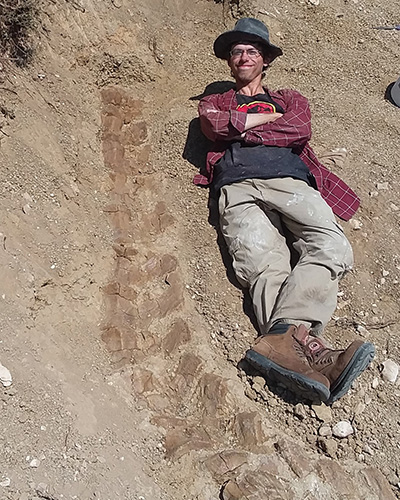Meet Kevin Sievers

Degree: BS Geoscience ’21
Research Interests: Vertebrate paleontology and biodiversity
Co-ops: Field Assistant, Bighorn Basin Paleontological Institute
Extracurricular activities: Drexel Naturalist’s Association, Paleontology & Geology Club of Drexel University
Awards: Students Tackling Advanced Research (STAR) Scholar 2017
What kind of research are you interested in?
My research interests are wide ranging, but typically revolve around the evolution, extinction and life history of major vertebrate lineages through deep time. I have been applying these concepts toward our understanding of extant biodiversity and the modern environment. Recently, I’ve found myself dabbling in fish of the fin-to-limb transition (specifically Tiktaalik, a bit of a Drexel celebrity at this point), Jurassic dinosaurs, and the fossil fauna of my home state of New Jersey.
Have you received any awards or scholarships while here at Drexel?
During my freshman year, I had the privilege of spending my summer on campus and being paid to conduct original research as a STAR Scholar. I spent ten weeks analyzing fossil fish jaws to compare them with closely related species. It was a tremendous experience that jumpstarted my professional career. (Keep an eye out for my first academic paper on the topic, to be published eventually, but hopefully soon.) Of course, I would be remiss not to mention Dr. Ted Daeschler, who I have known for the longest time and cannot thank enough for his guidance — to the point where, at the close of the STAR program, my best friend and I successfully nominated him as Mentor of the Year.
What were some of your most memorable travel experiences through Drexel?
Thanks to generous support from the Academy of Natural Sciences and the Office of Undergraduate Research, among others, I’ve been able to travel all over to present my research and network with now-colleagues at various conferences — everywhere from Calgary and Burlington, Canada to Albuquerque.
How was your first co-op experience?
For my first co-op, I flew out to Montana to work as a field assistant for the Bighorn Basin Paleontological Institute, where I helped excavate at several active research sites that date back about 150-million years. All the fossils from these sites are shipped back to the Academy, where I later helped prepare them for accession into the paleontology collections. Members of the public are allowed to pitch in and join the digs, so I had the wonderful experience of combining science communication skills with my professional interests. And the Montana sunset is absolutely one of the best sights in the world.
What is the coolest thing you can do at the Academy?
Find Herpetologist Ned Gilmore (typically, in the 4th floor research collections), and ask him about the chimpanzee. He’ll take it from there.
What has made your experience at Drexel special or unique?
My relationship with Drexel has always been more complicated than most people’s — I knew that I wanted to enroll at Drexel more than two years beforehand, a decision made thanks to the strength of the BEES department’s academic programs and its association with the Academy of Natural Sciences. In fact, some people at the Academy have known me for longer than I remember knowing them, somehow … so I suppose you could say it was destiny that I ended up here.
Why would you recommend the BEES program at Drexel for undergraduates?
Do you want to spend your college career outside? Take a look at the BEES Department. Do you want to work at a world-class natural history museum during your first week as a student? Take a look at the BEES Department. Do you want to be part of an environmental science major where you actually take classes about environmental science? Take a look at the BEES Department. Do you want to hug some frogs? We can help out with that, too.